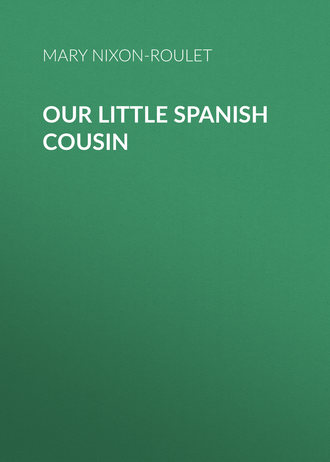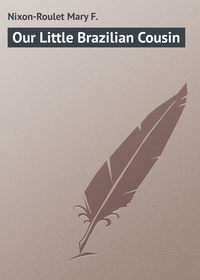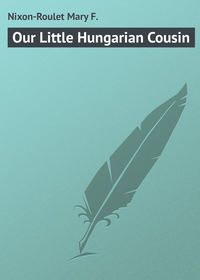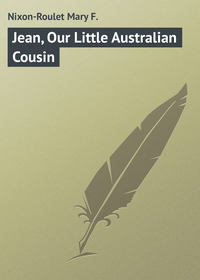 полная версия
полная версияOur Little Spanish Cousin
Best of all, it was time to have his head shaved, and of all things that was what he liked. His mother mourned, for the boy's hair was naturally curly, and in winter was as soft and pretty as black velvet. But all Spanish boys have their heads shaved in summer, and Fernando must be like the rest. It was cut so close that it made him look very funny, and his great black eyes shone like beads in his lean brown face, with no soft hair to soften its harsh outlines.
Fernando and Antonio were still devoted friends. They played together after school and on the holidays, and many delightful times did the two boys have, either in the Alhambra or at Fernando's home, where there were many city sights as interesting to Antonio as the delights of the old palace were to Fernando.
So devoted had they become that Fernando felt very sorry to leave his friend when the time came for him to accompany his mother and sister to their country home. Generally he had been delighted to go to the hacienda, and enjoyed the country school even more than the one he attended in the city, but this year he felt so badly over it that his father said:
"Never mind, my son. I shall bring Antonio out to visit you when school is over, and you may have a fine time together at the hacienda." This made Fernando more contented, and he went away with his parents quite happily.
As they started for the country on a bright May day, Juanita said, "Oh, mamma, see that strange cow! It is all dressed with flower-wreaths, and has bells around its neck and flowers on its horns. Why does that young girl lead it, and that old blind man walk behind, and blow that horn and beat the drum?"
"That is a cow to be won in a lottery," said the señora. "Manuel, stop; I wish to buy a ticket. How we Spaniards do love a game of chance! See, I shall buy a ticket for each one of you, and maybe your number will win the prize."
"Oh, thank you, mamma!" both children cried, for neither had ever had a lottery ticket before.
"Now I wish you to stop at a cigar-store, and buy a stamp13 for my letter to your Aunt Isabella, and then we will drive on."
As they turned into the main street leading to the Alameda, Juanita asked, "Oh, mi madre, what are those people sitting in the streets making?"
"Haven't you seen the ice-cream makers before?" said the señora. "No, I think you cannot remember last summer, can you? The gipsies go up to the Sierras in the very early morning, and get donkey-loads of snow, and the people make ice-cream in those pails with the snow in it. They sit right at their doors on the sidewalk and make the fresh cream, and any one can buy a glass of it."
"Do let us have some," cried the children, and their indulgent mother ordered the horses stopped while they ate some of the delicious fresh cream.
As the carriage rolled on down the steep street, so narrow that as Manuel said "one can hardly pass another after a full dinner," the swineherd was just coming out for the day, and Juanita cried:
"Oh, madre! See that man with the pipe in his mouth; what queer music he plays! What is he?"
"He is the swineherd, niña. See, he comes from his alley, staff in hand," the señora said. "Watch him blow his pipe without turning his head, and the pigs come after him, as if he had charmed them. Little and big, dark and light, fat and scrawny, there they come following him to pasture. Every alley we pass adds some curly tail to the procession. Now he is ready to turn out of the town into that grove, and see what an army of piggies follows him! He never looks for any of them, but they hear the music of his pipe and start because they learned long ago that it leads them to good pastures."
"I think they are too funny for anything," said the little girl. "Does he bring them back at night?"
"Yes, and every little piggy knows his own alley, and goes right home with a little frisk of his curly tail to say 'good night,'" said her mother, smiling.
"See those oxen; are they not splendid fellows? I love to see them draw their loads so easily. Beautiful creamy creatures, with their dark points and their great, soft eyes."
"What is that wooden thing over their heads?" asked Juanita.
"That is the yoke to couple them together. They are the gentlest animals in the world, these great, hornèd beasts, and the driver walks in front of them with a stick over his shoulder, which he seldom thinks of using."
"Oh, what a cunning little donkey!" cried the little girl, as they passed a tiny donkey laden with panniers filled with flowers, fruit, vegetables, bread, fowls, and even a water-jar. "How prettily he is clipped, all in a pattern."
"Mamma," said Fernando, "some of the donkeys that the gipsies have clipped have mottoes and pictures on them. I know a boy whose donkey has 'Viva mi Amo'14 on his side. I don't like that, for if the donkey doesn't love his master, it is telling a story."
His mother laughed. "We will hope he has a good little master, and then the donkey will care for him and not be telling a falsehood with his fur.
"But here we are almost to the hacienda, and how short the ride has seemed. Now if two children I know are good, we shall have a delightful summer, and although you are to be in the country, and thou, Fernando, will go to a country school, remember the saying of thy fathers:
"'Quando fueres par despobladoNon hagas desaquisado,Porque quando fueres per pobladoIras a lo vesado.'"15CHAPTER X.
GAMES AND SPORTS
The hacienda was more beautiful than it had been in the fall, and Fernando was soon busy as a bee. He had of course to attend school, but it was a country school, not so strict nor so large as the city one, and he enjoyed showing off his superior accomplishments to the other boys. This the others did not relish, and there was a grand fight to see which was the strongest, and when Fernando had whipped all the boys of his own size, he was happy and felt that he had not disgraced the name of Guzman. Manuel did not attend him in the country, and Fernando much enjoyed doing as he liked, roaming about, taking his own time to come home, tramping about the orange groves, or sailing boats in the brook.
When school was over and Antonio came for the promised visit, what merry times there were! The boys went swimming at all hours. They ran bareheaded all over the place, Mazo after them, their constant companion. Fernando had a few lessons to do each morning, a master to teach him his French, music, and drawing, – for boys of his class in Spain are accomplished as well as educated, – but these were soon over, and then, stung by the bees, burnt by the sun, wet by the rain, eating green oranges, doing in fact what American boys, or boys all over the world will do if let alone, this was the way in which the two Spanish boys spent their vacation.
Juanita, meantime, was having a very happy time. She, too, had a few lessons, and her aya was giving place to a governess, but she was still too young to learn much, and the beautiful out-of-doors was a great lesson-book to her. Riding Babieca, tagging after the boys, sun-tanned and rosy, she grew strong and hearty, and was never so happy as when allowed to go with her brother and Antonio. Generally they took very good care of her, and her mother felt that she was safe with the two boys. Fernando teased her a good deal, but Antonio was of a calmer mood, and was always her gentle knight.
All manner of games were played by these happy children, who, with their little neighbours of the nearest hacienda, made a merry group. They were simple-hearted little folk, and the boys had not reached the state described in the old Spanish rhyme of the boys of Madrid:
"They should be romping with us,For they are only children yet;But they will not play at anythingExcept a cigarette.No plays will cheer the PradoIn future times, for thenThe little boys of sevenWill all be married men."Fernando, and even the graver Antonio, entered into all the childish sports with the rest, and an especial favourite was a play very much like our "London Bridge is Falling Down," called the "Gate of Alcala." Two children are chosen to head the lines, and called Rose and Pink. They form an arch with their arms held up and their fingers locked, and under this the other children pass headed by the mother. They sing gaily a little dialogue:
Rose and Pink. "To the viper of love that hides in the flowersThe only way lies here."Mother. "Then here I pass and leave behindOne little daughter dear."Rose and Pink. "Shall the first one or the lastBe captive of our chain?"Mother. "Oh, the first one runs so lightly,The last one shall remain."Chorus. "Pass on, oho, pass on, aha!By the Gate of Alcala."The last child, with squeals of delight, is caught in the falling arms, and chooses whether she shall follow Rose or Pink, taking her place behind the one of her choice. When all have been chosen, there is a grand tug of war, the merry party singing, meantime.
Rose and Pink. "Let the young mind make its choice,As young minds chance to think;Now is Rose your leader,Or go you with the Pink?Let the young mind make its choiceBy laws the young heart knows.Now is Pink your leaderOr go you with the Rose?"Chorus. "Pass on, oho, pass on, aha,By the Gates of Alcala."The boys enjoyed playing soldier, and would whittle toy swords out of sticks, and form in line, marching and singing:
"The Catalans are coming,Marching two by two;All who hear their drumming,Tiptoe for a view,Aye, aye, tiptoe for a view;Red and yellow banners,Pennies very few.Aye, aye, pennies very few."Red and yellow bannersThe moon comes out to see;If moons had better mannersShe'd take me on her knee.Aye, aye, she'd take me on her knee.She peeps through purple shutters;Would I were tall as she.Aye, aye, would I were tall as she."Soldiers need not learn lettersNor any schooly thing;But, unless they mind their betters,In golden chains they swing.Aye, aye, in golden chains they'll swing.Or sit in silver fetters,Presents from the king.Aye, aye, presents from the king."The prettiest of all the games is that of the "Little White Pigeons," which all Andalusian children love to play. The little companions form in two rows, and, facing each other, dance forward and slip beneath the upraised arms of the opposite side. Thus they pass under the "Silver Arches" to Sevilla and Granada:
"Little white pigeons are dreaming of Seville,Sun in the palm-trees, rose and revel.Lift up the arches, gold as the weather,Little white pigeons come flying together."Little white pigeons, dream of Granada,Glistening snows on Sierra Nevada.Lift up the arches, silver as fountains,Little white pigeons fly to the mountains."Our little Spanish cousins play nearly all the same games that American children play, only their "Blind Man's Buff" is called "Blind Hen," and "Pussy Wants a Corner," is called "Cottage to Rent," and played with the rhyme:
"Cottage to rent, try the other side,You see this one is occupied."Their game of tag is called the "Moon and the Morning Stars," and is played by one child being chosen as the Moon and forced to keep within the shadow. The rest of the children, being Morning Stars, are safe only where it is light. If the Moon can catch a Star in the shadow, the Star must become a Moon, and as the Stars scamper in and out of the shadow, all sing:
"O the Moon and the Morning Stars,O the Moon and the Morning Stars,Who dares to tread – ohWithin the shadow.""Hide and Seek" the children played, and "Forfeits," and all manner of other games, and as the sun nearly always shines in Andalusia, the summer was one long merry round of out-of-door fun.
CHAPTER XI.
A TERTULIA
September found the children at home again, and Fernando back at school, while Juanita had a governess for a part of each day, though she was not expected to learn a great deal; for the Spaniards think if their girls are sweet and gentle they need not be very learned. If a Spanish girl of sixteen knows how to read and write, simple arithmetic, a little history, and can dance and embroider well, she is quite accomplished enough to marry, which is what most of them intend to do.
Things were going very quietly, when there came an excitement so great for the children that they were almost wild. This was the home-coming, in the latter part of September, of Pablo, just in from his long summer cruise, with a fortnight's leave of absence. He came home to celebrate his coming of age, and there was to be a tertulia in his honour. The children were to stay up to the party, and as it was the first time that they had been permitted to stay up after eight o'clock, they were delighted. To them it was the greatest event in their lives, and they were almost afraid to breathe all day, for fear the treat would be cut off. Juanita even stood quite still to have her curls made, which was generally a performance attended with agony, and before the end of which her aya was sure to say, "Hush, Mambru will certainly get you!" Mambru is to a little Spanish girl what a bogey is to an American child, and she will be very good for fear of Mambru. But the day passed off pleasantly, and the children were dressed and sent down to the patio to await the arrival of the guests.
The pleasant thing about a Spanish party is that there is no fuss made, and therefore everybody enjoys themselves. The hostess never tires herself out preparing for her guests so that she cannot be cheerful and agreeable when they arrive. The hospitality of Spain is perfect. A Spaniard gives his friends just what is good enough for himself, and never thinks of doing more. So there was not a great brewing and baking on the day of the party, and flushed, heated faces; but there were a few simple refreshments, much pleasant talk and hearty laughter among old and young. There were about thirty friends of the family who came in to talk and chat. The parents came with their daughters, for girls never go to parties alone in Spain, and old and young spent the evening together. Some one played on the piano and the young people danced, lovely Trinidad del Aguistanado dancing with Pablo. This Juanita watched with delight. Trinidad was the loveliest of all the girls, and she thought, of course, Pablo should have the prettiest maiden in all the world. She was as sweet as she was pretty, and said to the little girl:
"What is thy name, niña?" and when Juanita answered, sweetly:
"Juanita, to serve God and you," as all Spanish children are taught to answer, Trinidad kissed her on both cheeks, and gave her a rose from her girdle. At this Juanita was delighted, and Pablo sighed prodigiously. The older people, too, seemed well pleased with Pablo's choice, for the girl's family was as good as theirs, and the two had been friends for many years.
"Juanita," said Fernando in a whisper, "I believe that Pablo will bite the iron16 of the Señorita Trinidad. Will it not be strange to think of him beneath her window, singing of love to his guitar?"
"It will be beautiful," sighed the little girl, for Spanish children are always interested in the love affairs of their older brothers and sisters, and even little girls talk about them. "How handsome Pablo looks as he talks with her."
"They are as fair as the lovers of Teruel," said old Dolores, who was at the party to take care of her little charges.
"Tell us about them," said Juanita, eagerly, for she dearly loved Dolores's quaint stories; and the aya began:
"In the town of Teruel there lived, many years ago, a Spanish knight, Don Juan Diego Martinez de Marcilla, and he loved with all his heart Doña Isabel de Segura. Alas, unhappily! for the fathers of the two lovers were enemies, and would not listen to love between them.
"'Thou art but a second son,' said Don Pedro de Segura, the father of Doña Isabel. 'Moreover, thou hast not a fortune equal to that of my daughter, who possesses thirty thousand sueldos in good gold, and is my sole heiress.'
"'Full well I know that I am in no wise worthy of thy fair daughter,' said Don Juan, 'and upon her grace have I no claim save that she loves my unworthy self. But since this is God's truth, I pray you give me the chance to prove my devotion, and I will furnish sufficient fortune to equal hers. I go to the wars with my lord, King Sancho of Navarre. Grant me five years in which to gain this fortune, and give me your promise that for that length of time you will not force Doña Isabel to marry another.'
"Doña Isabel was very young, and her father very fond, and by this he could keep her with him five long years, and, moreover, marry her to whom he pleased, for he said to himself, 'In that time both of them will forget,' and so he smilingly said:
"'Your words have some reason. Go with God, and if you return, well and good. My daughter shall not marry against her will for five years to this day, but mark me, rash youth, not one day more shall she wait.'
"Then the lovers bade each other farewell, and Don Juan rode to the wars. These were waged against the wicked Moors, and with knights and squires, the armies of Don Alphonso of Castile, Don Pedro of Aragon, and Don Sancho of Navarre fought long and fiercely until, at the great battle of Las Navas de Tolosa, the Moor was crushed. Many a valiant deed was done, and Don Juan was bravest of them all. He broke through the chain which guarded the tent of the Moorish king, and thereby gained great glory and won for himself the right to wear a chain around the margin of his shield in honour of the day. He gained great renown and fortune, but, alas, he was sorely wounded, and it was more than five years before he could return to his beloved. He arrived in Teruel but one short day after the time was up, and found Doña Isabel married to another, Don Pedro Fernandez de Azagra. Despairing, he desired to see his beloved once more, and climbed to her window on her wedding-night. Finding her alone and her husband sleeping, he implored her to give him one last kiss. She refused, and said, weeping, 'Alas! you came not and I thought myself forgotten. I am wedded to this good man, and to him alone belong my caresses.'
"At this his heart broke, and crying, 'Farewell, beloved!' he dropped dead at her feet.
"At that moment her husband awoke, and she told him straightway the truth, at which he said, 'Thou hast been cruel and unkind to this good man, but to me faithful and true, and I shall but love thee the more!' and he took the body of the poor Don Juan and bore it secretly to his father's step and laid it down and fled away.
"When the body of the knight was found, there was great mourning, and he was given a grand funeral at the cathedral, to which all Teruel came to do him honour. There also came the unhappy Doña Isabel, disguised so that none might know her, and, determined to give her lover in death the kiss which she had denied him in life, she stooped to kiss his lips. Lo! the eyes unclosed, he smiled at her, and they closed again, and she fell beside him dead! All were struck dumb with horror, but Don Azagra came forward and told the mournful story, whereupon the two bodies were buried in the same grave.
"'Separated in life, in death they shall be together,' said the generous knight who had been her husband but not her beloved; and this is the sad, sad story of the lovers of Teruel."
"Oh, thank you, Dolores, it is a beautiful story," cried Juanita, and the young people who had gathered around to hear clapped their hands, and thanked her, too.
"What think you, Señorita Trinidad, would you have kissed your lover had you been Doña Isabel?" asked Pablo of the young girl.
"I should not have married the other man, señor," she said, flushing prettily.
"Come, Trinidad, you must sing for us," cried one of her friends. "Sing the song of Santa Rita," and Trinidad, with a merry little glance at Pablo, sang the gay little song which Spanish girls sing in jest, asking Santa Rita to procure them a good husband.
"Santa Rita, Santa Rita,Cada una de nosotros necesita,Para uso de diarioUn marido milionario,Anunque sea un animalSi tal, si tal, si tal, si tal,Un marido milionario,Anunque sea un animal."17Everybody applauded loudly, and Trinidad, laughing and blushing, sang again. The older people sat about serenely, some talking, others playing cards or dominoes. The younger ones played sprightly games and talked like magpies, and the children listened spellbound.
"Who art thou, Pablo?" laughed one, and Pablo answered, merrily:
"Ole Saltero, sin vanidad,Soy muy bonito, soy muy sala!"18Refreshments were passed around, very simple ones. There were trays of water, and by each glass round lumps of sugar, which the guests dipped in the water and ate, hard little cakes, cups of thick chocolate into which finger cakes were dipped and eaten, and some charming little bonbons. There was no wine, for although the finest wine in the world is made in Spain, the Spaniards are great water drinkers, and seldom have wine except at dinners. The men all smoked, but not the ladies, for while the Mexican women sometimes smoke a dainty cigarrillo, Spanish women do not.
Later on, Pablo's health was drunk in tiny glasses of sherry, as this was a special occasion, and pleasant speeches were made to him, wishing him all success in his career.
"Thou art now a man, my son," said his father, proudly and affectionately. "Remember that since the time of the Emperor Charles V., thy fathers have had the right to wear the Golden Key19 upon their hip, and do nothing to disgrace thy name. On the sword of my grandfather was engraved the motto, 'Do not draw me without reason nor sheathe me without honour!' Let his motto be thine own, and remember that to a Spaniard honour comes first."
Then the party broke up, and Fernando and Juanita were trotted off to bed, and sleepily murmured their evening prayer:
"Jesus, Joseph, Mary,Your little servant keep,And with your kind permission,I'll lay me down to sleep!"CHAPTER XII.
VIVA EL REY!
All Granada was in a flutter! It was the brightest of October days, and the sun seemed to be trying to be as bright as the people, or the people to be as gay as the sunshine. Fernando and Juanita hopped out of bed and ran to the window the first minute they were awake, and squealed with delight when they saw that the day was fair.
"Oh, mamma!" cried Fernando. "Is it not glorious? The fête will be a success!" and Juanita echoed her brother, "Is it not wonderfully fair!"
"Come and have your chocolate quickly, like good children," returned their mother, "for you must be ready early."
As soon as the children were breakfasted, they were dressed in their best clothes, Juanita all in white, with a gay sash, and Fernando in a sailor suit of blue, and they waited impatiently for their parents to be ready to start for the fête.
It was a great day for Granada, for the king was coming to visit the city, and it had been many years since royalty had honoured the Andalusian town. Spaniards are nearly always devoted to their king, and in Andalusia there are very few who are not fond and proud of the young King Alphonso.
In Northern Spain there are many who are called Carlists, and who believe that the descendants of Don Carlos are the lawful kings of Spain, and these have often gotten up revolutions and tried to set their own favourites up as kings.
In Barcelona and some of the eastern provinces there are many who like neither King Alphonso nor Don Carlos, and these are anarchists; but Granada was heart and soul for the king, and all the people were overjoyed at his coming.
Every balcony in the city was covered with flowers; flags and banners floated everywhere. The Alameda was ablaze with decorations, and every face wore a smile of welcome. The programme for the day was a simple one. The king was to be met at the station by a delegation, a band, and a mounted escort, witness a military review on the Alameda, and depart by an afternoon train. All Granada must see him, and Fernando and Juanita with it.
It had been decided that the best time for the children to have a good look at the king was when he drove to the Alhambra, and Manuel and Dolores started early to take them to meet Antonio, who had promised to provide places within the Alhambra grounds, where the general multitude would be less likely to go, and where the children would have a finer view. Pablo went with them, for he was still at home, and he walked beside Babieca to see that Juanita did not fall off, on her long ride up-hill.







